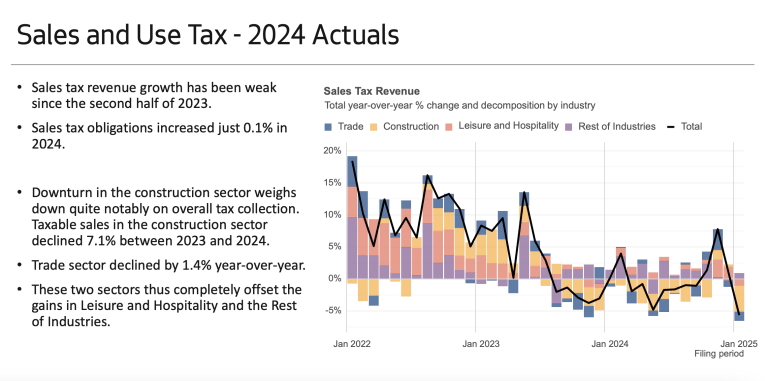Councilmember Saka Looks for the Bright Side in Grim Local Revenue Forecast
Won't FIFA bring in unanticipated money? What about school zone cameras? Canadian cruise customers? People buying sandwiches? ANYTHING??

By Erica C. Barnett
On Wednesday, the city council's budget committee got briefed on the latest bad news for upcoming city budgets: Revenues are expected to come in lower than anticipated over the next two years, forcing the city to consider substantial budget cuts. The shortfall is the result of numerous small and large revenue reductions, but the biggest change is a decline in projected revenues from the JumpStart tax, which is now expected to produce $167 million less over the next two years than previously assumed.
Under the original JumpStart law, these funds would have gone to a specific list of spending priorities that were outside the general fund; last year, the council codified what had become a regular practice and passed a law saying JumpStart can be used for any purpose, so shortfalls can now have a direct impact on basic city services. The new numbers also include shortfalls in sales tax revenues, business and occupation taxes, parking meter revenues, and utility taxes, among lots of other items marked by red ink in the Economic and Revenue Forecast Council's presentation.
During the largely grim presentation, Councilmember Rob Saka sought reasons for optimism. First, he said that even though revenues from court fines have been declining, his committee just approved new speed cameras in school zones and is planning to add several automated speed cameras in locations outside school zones in the near future, which, he said, should improve the outlook. The 2025-2026 budget the council adopted last year, however, already includes projected revenues from the new school-zone cameras—$4.2 million, against $1.2 million in new spending to get the cameras up and running.
Still looking for the bright side, Saka wanted to know what kind of new revenues the city expects to bring in from the FIFA World Club Cup in 2025 and the FIFA World Cup in 2026. Won't those big events help line the city's bank accounts in ways the revenue forecasts don't account for? Not exactly, council central staff director Ben Noble responded.
The huge economic bump FIFA boosters are projecting—supposedly $500 million or more across the two World Cup years—is a budget trick that includes things like hotel rooms that would already be sold out at the height of summer anyway. "We're going to see less of a bump than we might then you might otherwise imagine, because we're plenty busy in the summer all the time," Noble said. "I see those numbers, and as an economist, they bother me a little bit, because they're they're usually quoted out of that important context."
Also, all the admissions taxes for World Cup events will go to the county, not the city, so the main boost to city revenues will be from sales taxes from visitors, including international visitors, who would not otherwise have come to Seattle.
Saka tried a final time: What about cruises and other types of tourism? The Port of Seattle "anticipates this to be the busiest crew season ever in Seattle history,” Saka said. “On the tourism sector, with respect to the cruise industry next year, what other kind of signature, marquee events or opportunities could help drive tourism here in Seattle, all the tomfoolery outside of Seattle notwithstanding?"
But Economic Revenue Forecast Council director Jan Duras only offered more bad news: "When it comes to that record-breaking cruise season, that was, again, the prediction that was made more than two weeks ago, before the recent turmoil in the financial markets, before all the potential impacts on cancelation that Canadian citizens might consider. ... If people see their savings shrink, if they are worried about the future, they're probably less likely to book a cruise ship vacation. They are less likely to travel. They might reconsider their plans."
Saka wasn't the only one looking for some good news amid the gloom. Dan Strauss also offered, hopefully, that it's possible the city hasn't accounted for all the people who will return to the office five days a week and start spending more money during the day. "I was supposed to bring my lunch today, and I forgot, so we'll have a little bit more sales tax revenue in the buckets for today," Strauss joked.
Alexis Mercedes Rinck, who reportedly plans to propose a local progressive revenue package before the city starts its annual budget process, countered her colleagues' attempts at optimism by saying the council is "going to be responsible for crafting a budget in what might be the most worst economic storm in our lifetime, and ... we also need to be honest that tightening the belt and coordinating with our regional partners isn't going to close a gap this big. ... And so looking forward, [we should be] looking at our options for being able to raise progressive revenue to protect our investments in critical city services."




